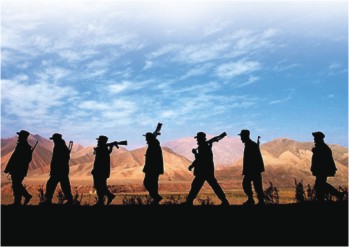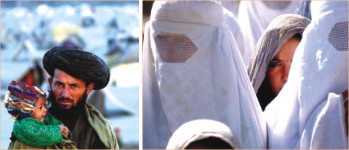
Inside
|
Broken Promises Writing from Kabul, Ahmed Rashid examines the pattern of unfulfilled commitments and failed expectations that have left Afghanistan mired in chaos In Kabul the traffic throbs and the bazaars are full in the evenings when Kabulis go for a stroll. During the day the streets are full of children going to and coming from schools. There have been a few suicide car bombs, but they are too intermittent to stop the bustling city of four million people from moving around.
Under the auspices of Nato, 10,000 British, Canadian, Dutch, and American troops are fighting the Taliban, who now virtually control the entire countryside in the five provinces in the south which are dominated by the Pashtun tribes. The Taliban are trying to cut the main road which links Kabul with Kandahar, and onwards to Herat. More than 2,000 Afghans have been killed this year, many of them civilians such as teachers and aid workers as well as security forces -- all targeted by the Taliban. Nearly fifty foreign soldiers have also been killed. Ten of the 4,300 British soldiers battling the Taliban in the southern province of Helmand have been killed. Helmand is the centre of the drug trade where at least one third of the Afghan poppy crop -- which is turned into heroin -- is grown and then exported. The British last fought in this region during wars with the Afghan tribes in the 19th century. Five years after September 11, 2001, foreign troops could be on the verge of another disaster in Afghanistan, while many Afghans face prolonged uncertainty and destabilization after coming out of 25 years of war, occupation, and civil war. Five years ago, President George W Bush and Prime Minister Tony Blair vowed never to abandon Afghanistan again, and to rebuild it as a bastion of democracy and modernity in the heart of the Muslim world. Their promises lie broken and soiled. In the overcrowded cities there have been no jobs or amenities for the millions of returning refugees and the restless young -- 45 percent of the population is under 18 years of age. In May, after a traffic accident, rioters swept through Kabul, burning down the offices of Western aid agencies, and were on the verge of attacking the palace of President Hamid Karzai before being pushed back by troops. Twenty people were killed. Everything that has happened since 9/11 -- the war in Iraq, the crisis with Iran, the war in Lebanon -- has dragged money, resources, attention, and Western troops away from Afghanistan. The lack of US attention to Afghanistan has allowed the country to slip below the radar screen for European nations as well. In a nutshell, the West's promise to rebuild the country has faltered badly. To win the war against Islamic extremism, US forces needed to provide security to the Afghans and the aid agencies to rebuild the country. Instead, the US military presence has been too small and wholly orientated to the hunt for Osama bin Laden. For the first three years after the 2001 war, Secretary of Defence Donald Rumsfeld, who was never much interested in Afghanistan, did not allow European peacekeeping troops to spread out to other cities. Washington's lack of attention has allowed its wily ally, Pakistan's President Pervez Musharraf to play a double game of sorts, by pledging support to the war against terrorism, and cooperation in catching leading al-Qaeda figures, but allowing the Taliban to flourish in the border belt as a way of maintaining pressure on Karzai. The Afghanistan-Pakistan border region is still the ideological centre of global jihadism. Al-Qaeda lives and flourishes there, like a beast, spawning new groups around the world. European forces under Nato command are only now -- five years too late -- being deployed to the Taliban heartland in the south. Since their defeat in 2001, the Taliban have been free to reorganize, fill the political and military vacuum and slowly work on the people's frustration with the lack of reconstruction. The most critical mistake of the international community has been the failure to rebuild the country's destroyed infrastructure fast enough. Roads, power, housing, and water were the essentials. Instead, five years on, only one section of the all-important ring-road around the country has been rebuilt. Roads were critical for a land-locked country which desperately needed to be connected to its neighbours. According to the UN Development Program, only 23 percent of Afghans have access to clean drinking water. Major canal systems and dams built for irrigation in the 1960s still await repair. The shortage of water systems, and the total absence of investment in agriculture, has led to an explosion of poppy production -- which requires little water. Only ten percent of Afghans receive any electricity. One third of Kabul's four million citizens receive power, and that too for a few hours, every third night. The power shortage is getting worse, not better. The government bought huge diesel generators to fill the power gap in Kabul and received a $70 million subsidy from the US Agency for International Development to buy fuel. Without explanation, USAID has cut that subsidy and this winter will be even harder. Reconstruction without electricity is impossible.
In the past six months, there has been a vicious blame game being played in Kabul, with the international community and Afghan leaders blaming each other for the failures, and for the resurgence of the Taliban. The US and its Western allies are now playing catch up in Afghanistan, trying to rectify the neglect and the mistakes of the past five years. It is still not too late, but the West has to show long-term determination to crush the insurgency, and then seriously help reconstruct the country, while Karzai has to get tough with his corrupt ministers and govern more effectively. Ahmed Rashid is the author of Taliban: Militant Islam, Oil and Fundamentalism in Central Asia (Yale University Press). |
 Yet, further south, thousands of Afghans are once again becoming refugees in their own country as they flee a major offensive by the once again resurgent Taliban.
Yet, further south, thousands of Afghans are once again becoming refugees in their own country as they flee a major offensive by the once again resurgent Taliban.  Karzai and his cabinet of ministers have, in the meantime, provided minimal leadership and vision. Many of them have been caught in a web of infighting, corruption, and drug trafficking. Karzai has reverted to traditional Afghan methods of governance, bringing back the warlords and their militias and revoking the modernization agenda set out after 2001. Instead of solidifying the newly elected parliament, which the people have enthusiastically endorsed, and mobilizing people through its members, Karzai has virtually ignored the parliament.
Karzai and his cabinet of ministers have, in the meantime, provided minimal leadership and vision. Many of them have been caught in a web of infighting, corruption, and drug trafficking. Karzai has reverted to traditional Afghan methods of governance, bringing back the warlords and their militias and revoking the modernization agenda set out after 2001. Instead of solidifying the newly elected parliament, which the people have enthusiastically endorsed, and mobilizing people through its members, Karzai has virtually ignored the parliament.